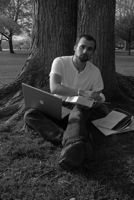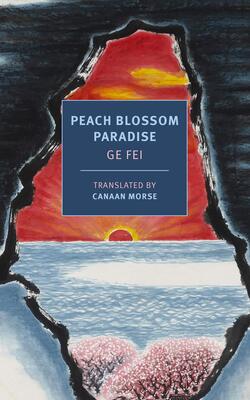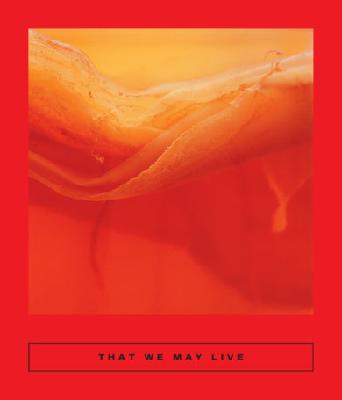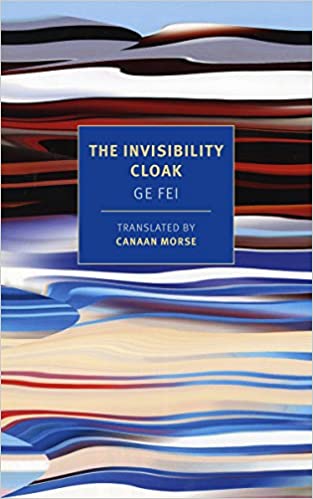Posts
By Canaan Morse, February 15, '11
The official announcement of Asymptote's first issue:
The inaugural issue of ASYMPTOTE is now out and features original essays by Mary Gaitskill and Alain de Botton, fiction by Thomas Bernhard and Yoram Kaniuk, poems by Aimé Césaire, Ko Un, Gleb Shulpyakov, Pura López-Colomé and Habib Tengour; drama by Toshiki Okada; visual poetry from Iceland (on video) and Japan; a Swedish Poetry Special Feature, a recreation of one day in the life of Tang Dynasty poet Du Fu, an interview with Francis Li Zhuoxiong(2010 World Cup songwriter) and more.
More…
By Canaan Morse, January 19, '11
Paper Republic Associate Wang Danhua's write-up of Dangdai magazine's Best Novels of 2010 Award election ceremony, translated and with commentary by Canaan Morse. Read on to find out who won!
More…
By Canaan Morse, December 9, '10
Of the Fiction:
I have to give Bei Shan’s “When You Go to Sa City” (北山,你们去卅城) one thumbs-up for being pretty 给力. From a writer’s point of view, I find that while it is easy to write about vice, it requires much better insight and more courage to appreciate the artistry of vice well done. His description of the brothels’ glittery guest-end exterior and cold, professional human resources system is so in sync with my understanding of China that I am ready to believe such a place exists. I would also be interested in knowing what else Bei Shan has written.
More…
By Canaan Morse, December 8, '10
Fourteen pieces of visual art, nine brief essays, a poem and nine stories.
The longest written piece is eleven pages long.
The most commonly used phrase is 耿耿于怀, which means “to take (sth.) to heart,” usually connoting resentment, the memory of a past injustice.
There are four pieces I would look at again, four that I would recommend.
More…
By Canaan Morse, November 18, '10
China Foreign Languages Press is currently looking to hire qualified, preferably bilingual English-speaking authors to participate in its landmark book series "Cities of China (中国城记)." Dedicated to presenting fresh, in-depth illustrations of rising Chinese cities to readers across the globe, the books in this series are written exclusively by foreign professional authors. Below is a translated sample from the "Cities of China" official introduction:
More…
By Canaan Morse, November 12, '10
From Qarrtsiluni editor and Paper Republic friend Nick Admussen:
Qarrtsiluni is an online literary and artistic journal active since 2005 that features collaborative theme issues, posted in the form of a daily weblog. Learn more about it at our About page. This call for submissions, plus introductions to the issue's editors, is available here.
More…
By Canaan Morse, May 23, '10
The website for Oklahoma University's virgin publication Chinese Literature Today is up here, and it looks like they're working on it daily. It (the website) is appearing two steps ahead of CLT's inaugural issue, due to be published this July.
More…
By Canaan Morse, February 8, '10
This absurd little floater is actually a year old, born when a Facebook status "Happy 牛 Year!" tickled my four-year-old gooberish sense of humor and inspired a poem even worse than this one. Somehow, it all came groaning back to me two nights ago, and strange motivation turned it into more than a poem--a contest!
The Entry: One poem of any reasonable length.
The Requirements: Poem must be macaronic (dual-language...isn't my vocabulary impressive? Of course it is). It must include all twelve character signs of the Chinese Zodiac, and those characters must interact with the English in such a way that the two become fundamentally connected to each other; for example, the poem below inserts characters into English words and sentences in such a way that an English speaker could reasonably guess at the pronunciation of the characters from the English sounds they substitute (Yes, yes, I know; this is just a game). Yet mine is only one method; I'm sure there are much cleverer ways of making said connection, and they are welcome!
The Deadline: February 14th, First Day of the New Year! Duh.
The Prize: A beer at the Bookworm (or four Tsingdaos at 平民 restaurant of your choice) bought by yours truly. If nobody enters, I'll just buy myself a case of Yanjing and drink in my apartment...so, par for the course.
All poems to be judged utterly subjectively and by vote. My entry, which shouldn't be hard to beat, totally counts.
**
More…
By Canaan Morse, December 11, '09
Wednesday’s talk was given under a specific heading, the “Public Intellectual Series Number 1,” and therefore carried a mandate as well as a topic. I won’t say more to that standard beyond that its mandate was fulfilled by a clear, cohesive and relatively comprehensive lecture. Take “lecture” for its older meaning: that form of academic art that distinguishes the professors you remember from the ones you don't.
Before the talk started, Nick distributed to the audience a packet of twelve literary excerpts composed of Chinese poetry, English translations and Chinese-inspired original English poems. The list (copied directly):
Axe Handles, by Gary Snyder
Preface to Wen Fu, by Lu Ji, trans. Achilles Fang
Hearing a Bell in the Mountain Night, Chinese original (Zhang Shuo) and Nick’s translation
Nowhere to Go, Gone by Nick Admussen
Nine Quatrains of Casual Interests (the seventh), by Du Fu, Nick’s translation
In a Station of the Metro, Ezra Pound
DEATH BY WATER, from The Wasteland, by T.S. Eliot
Drip from the Eaves, by Xia Jing, trans. Silvia Marijnissen
Allusion, by Nick Admussen
Tu Fu Watches the Spring Festival Across Serpentine Lake, by Frank Bidart
Ballad of Lovely Women, by Du Fu, trans. David Hawkes (!)
I Had Come to the Four-Doored Room, by Nick Admussen
More…
By Canaan Morse, December 8, '09
What: Bookworm Public Intellectual Series 1: Nick Admussen
Where: The Bookworm, Sanlitunr Nanjie
When: Dec. 09, 7:30-9:30 p.m.
Nick Admussen is a PhD candidate in Chinese literature at Princeton University, and is also a published poet and translator. He will be talking about the influence of Chinese poetry on poetry elsewhere in the world, and of the difficulties facing literary translators.
See the Bookworm posting for more.
More…
By Canaan Morse, December 2, '09
Title: *IUP Alumni Event: An Evening with Hong Ying
When: Sat Dec 05 17:30:00 +0800 2009
Where: Yuanfen New Media Art Space, 798
Description: IUP alumni, teachers, and students are cordially invited to join us for an evening program of literature, music and Sichuan food courtesy of 天下盐. Critically acclaimed author 虹影 will read from and talk about her newest work, Good Children of the Flowers. Musical interludes from cello and viola duo Kevin Olusola and Wu Tsong.
Please RSVP to David Chao
(e: david.chao@alumni.jesus.ox.ac.uk, t: 152 1013 4389)
IUP Alumni and Guests: RMB 200
Current IUP students and teachers attend free of charge.
Tickets may be purchased at the door
More…
By Canaan Morse, October 2, '09
From Lao She's 《四世同堂》, Chap. 14.
The setting is Japanese-occupied Beijing, near the beginning of the war. Welcome 中秋.
The space of time right around the Mid-Autumn Festival is Beiping’s most beautiful season. The temperature is neither hot nor cold, and the days and nights are equally balanced. There are no winter sandstorms howling in from Mongolia, nor summer thunderstorms perversely mixed with hail. The sky is instead so high, so blue, so bright, as if it’s smiling down on the people of the city, telling them: in these days, you need fear no threat nor harm from Nature. The mountains to the North and West darken their shade of blue, and in the sunset evenings drape themselves in many-colored robes.
More…
By Canaan Morse, June 29, '09
Adam Kirsch’s review of David Hinton’s Classical Chinese Poetry: An Anthology begins with a brief retrospective of Ezra Pound’s work as the first serious translator of 中国古诗. Its use is primarily rhetorical. Though Kirsch is careful to note the obvious care with which Pound handled his task, he spends the greater portion of his word limit in describing the seemingly insuperable gaps in expertise that separated the translator from his subject. This allows him, when he gets to Hinton, to endow the reader with a sense of perspective as well as a vague idea of progress. I say rhetorical because the most dependable avenue by which Kirsch might have been able to derive substantial conclusions regarding Hinton’s relative merits—direct textual analysis—he leaves entirely alone. This may be due to lack of confidence in his own ability to critique pieces whose originals he can’t read, or because he believes that evaluation is a task better left to the reader. Both are worthy considerations.
More…
By Canaan Morse, April 3, '09
Back in August, Eric mentioned in one of his threads (I think it was Words) that he found similes in Chinese prose to be palpably awkward—that every time he came to a 就像 or a 跟什么什么似的 it gave him the elbow. At the time, I agreed with him, although now I’m not quite sure why. Such may be the case within the anti-之乎者也 literature of the past twenty years, but going farther back into the era when all those metaphoric particles from classical were still in common use—犹、如、仿佛 and the rest of them—uncovers a kind of flexibility in setting up similes which quite unexpectedly reveals the poverty of English in this regard.
Take this passage:
景泰蓝的天空给高耸的梧松勾绘出团员的大叶,新月如一只金色的小舟泊在疏疏的枝桠间。 粒粒星,怀疑是白色的小花朵从天使的手指间洒出来,而遂宝石似的凝固的嵌在天空里了。但仍闪跳着,发射着晶莹的光,且,从冰样的天空里,它们的清芬无声的霰雪一样飘坠。
More…
By Canaan Morse, December 4, '08
The Chinalyst Best China Blogs contest is open (actually, it's been open for a while) and PR is now in the running! We got a late start, but I'm absolutely confident that with a little publicity we can pull into at least second or third in our category (General).
Here's the link to our category. Go vote!
By Canaan Morse, July 15, '08
He Qifang (1912-1977) was a poet, essayist and revolutionary of the Modern Period, one of the group of well-heeled but oppressed and intellectually voracious young people who, having at one point campaigned for democracy, threw their lot in with the Communist Party once the Nationalists proved themselves incompetent at solving the country's problems. He began as a poet and a creative nonfiction writer, and his first publication Record of Painted Dreams (hua meng lu) is composed of a series of brief but intense pieces of poetic prose, which in their manipulation of tense and image show a kind of sensitivity that is hard to find anywhere else in the literature of that period.
The more I listen to Wolfgang Kubin, the more his opinions unsettle me, but I agree with him in spirit on one point: the sixty years before 1949 produced an incredible amount of original, well-wrought and moving work. Most of it has fallen through and disappeared into the gap that opened up between the last generation of China students and this one, in part due to a lack of good quality translations, which damages its appeal as fashionable literature. He Qifang is an extreme example of a first-class writer who has been almost entirely forgotten.
Below is one of the shortest entries in the Record, entitled The Peddler. I'm gonna take it on faith that it's bad manners to copyright, though I do plan on publishing this later.
More…
By Canaan Morse, April 27, '08
Goodbye Once More to Cambridge
Xu Zhimo
Translation by Canaan Morse
Over blades of grass I’m leaving,
as over them I once came,
a slender hand privately waving
goodbye to this western plain.
Light falls from the tress of the willow
(a bride by the evening stream)
murmurs out in bright alloy the water
and through all the aisles of me.
while the childish algae that play
in the mud of the riverbed
duck from the current, wave me away
as a gift from the giver—
—and rise to a dream, the dream
of a rainbow, distilled from
the news of the wind in the green
fractured face of the spring by the elm;
For dreams? Bow a long elm pole
to pull slowly for a place of unthinkably bright;
load that, somehow, to the paint,
and sing as you drift through the night.
But—I have not that right,
my escape is the broken reed of farewell;
as some sympathy dims the cicadas and gloom
is described by the evening bell.
And under a shadow I’m leaving,
just as under a shadow I came.
The pale hand brushes silently, leaving
stray clouds on this autumnless plain.
More…





